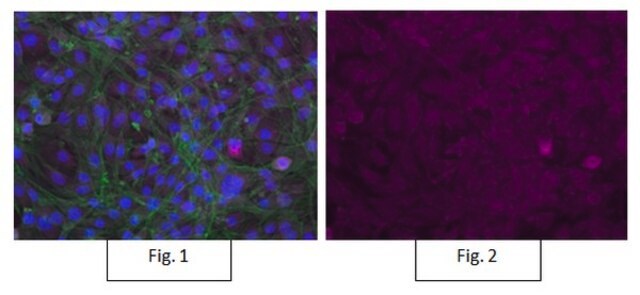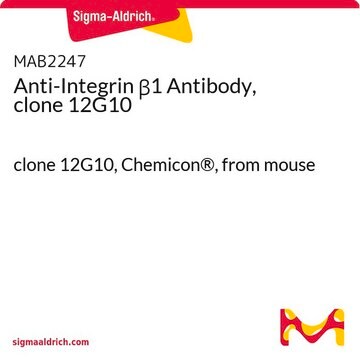MABT529
Anti-Integrin beta-1 (CD29) Antibody, clone 13C4.1
clone 13C4.1, from mouse
Synonym(s):
Integrin beta-1, CD29, Glycoprotein Iia, GPIIA, Integrin VLA-4 subunit beta, Very late activation protein, beta polypeptide
About This Item
Recommended Products
biological source
mouse
Quality Level
antibody form
purified immunoglobulin
antibody product type
primary antibodies
clone
13C4.1, monoclonal
species reactivity
human
technique(s)
immunohistochemistry: suitable (paraffin)
western blot: suitable
isotype
IgG1λ
NCBI accession no.
UniProt accession no.
shipped in
ambient
target post-translational modification
unmodified
Gene Information
human ... ITGB1(3688)
General description
Specificity
Immunogen
Application
Cell Structure
Quality
Western Blotting Analysis: A 1:2,000 dilution of this antibody detected Integrin beta-1 in 10 µg of U937 cell lysate.
Target description
Linkage
Physical form
Storage and Stability
Other Notes
Disclaimer
Not finding the right product?
Try our Product Selector Tool.
recommended
Storage Class
12 - Non Combustible Liquids
wgk_germany
WGK 1
flash_point_f
Not applicable
flash_point_c
Not applicable
Certificates of Analysis (COA)
Search for Certificates of Analysis (COA) by entering the products Lot/Batch Number. Lot and Batch Numbers can be found on a product’s label following the words ‘Lot’ or ‘Batch’.
Already Own This Product?
Find documentation for the products that you have recently purchased in the Document Library.
Our team of scientists has experience in all areas of research including Life Science, Material Science, Chemical Synthesis, Chromatography, Analytical and many others.
Contact Technical Service








